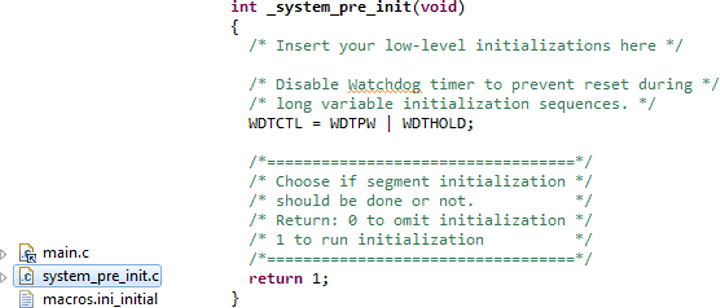SLAU533D September 2013 – April 2017
-
MSP430F5529 LaunchPad™ Development Kit (MSP‑EXP430F5529LP)
- Trademarks
- 1 Getting Started
- 2
Hardware
- 2.1 Block Diagram
- 2.2
Hardware Features
- 2.2.1 MSP430F5529
- 2.2.2 eZ-FET lite Onboard Emulator
- 2.2.3 Integrated Full-Speed USB Hub
- 2.2.4 Power
- 2.2.5 Clocking
- 2.2.6 Application (or "Backchannel") UART
- 2.2.7 Emulator and Target Isolation Jumper Block
- 2.2.8 Isolation Jumper Block: 3.3-V and 5-V Jumpers
- 2.2.9 Isolation Jumper Block: Emulator Connection and Application UART
- 2.3 Measure Current Draw of MSP430 MCU
- 2.4 Using an External Power Source
- 2.5 Using the eZ-FET lite Emulator With a Different Target
- 2.6 USB BSL Button
- 2.7 BoosterPack Plug-in Module Pinout
- 2.8 Design Files
- 2.9 Hardware Change Log
- 3
Software Examples
- 3.1 MSP430 Software Libraries: driverlib and the USB API
- 3.2 Viewing the Code
- 3.3 Example Project Software Organization
- 3.4 USB Configuration Files
- 3.5 Out-of-Box Experience: emulStorageKeyboard
- 3.6 Example: simpleUsbBackchannel
- 3.7 Starting Device Manager
- 4 Additional Resources
- 5 FAQs
- 6 Schematics
- Revision History
3.5.2 Pre-Initialization
Pre-initialization refers to the activity that happens before the first line of main().
As described for the simpleUsbBackchannel example (see Section 3.6.5.1), it is often convenient during development to disable the watchdog at the beginning of execution. But for some application programs, including this demo, there's a twist. Programs that contain a large amount of allocated RAM may never reach the first line of main(). This is because the first line of execution of a C program is not actually the first line of main(); instead, the compiler inserts code prior to main that handles preparatory functions, like initializing variables.
So if the amount of allocated RAM is large enough, the time required to initialize it may exceed the watchdog's expiration time. To the developer, this appears as execution never quite arriving to the first line of main().
A solution to this is to define a pre-init function. In CCS, this is the function _system_pre_init(); in IAR, it is the function __low_level_init(). The developer can write code here that executes immediately after a reset, before RAM is initialized. When large amounts of RAM are allocated, it can be necessary to hold the watchdog here.
The F5529 LaunchPad development kit software demo does this. Figure 29 shows the implementation of both the system_pre_init.c file in the project and the function inside it.
 Figure 29. Disable the Watchdog in Pre-Initialization
Figure 29. Disable the Watchdog in Pre-Initialization